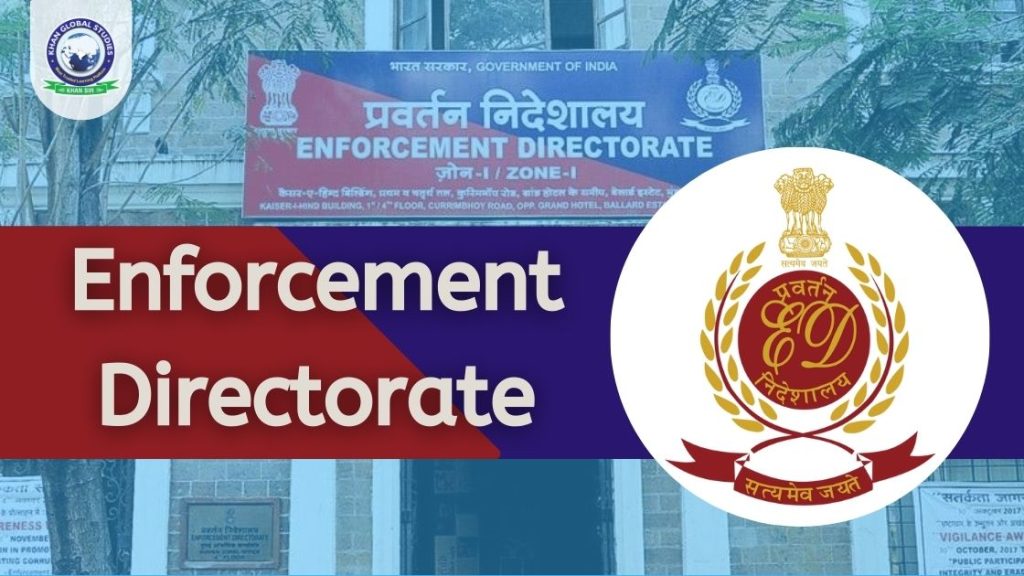The Enforcement Directorate is a multidisciplinary organization that is part of the Department of Revenue of the Ministry of Finance. It functions to enforce the provisions of two special financial laws – the Foreign Exchange Management Act, 1999 (FEMA) and the Prevention of Money Laundering Act, 2002 (PMLA). Apart from appointing personnel by direct recruitment, the Directorate also appoints officers on deputation from various Investigative Agencies, Customs and Central Excise, Income Tax, Police etc. departments.
What is ED or Enforcement Directorate?
When India became independent from British rule, it enacted the Foreign Exchange Regulation Act in 1947. It was monitored by the Department of Economic Affairs of the Finance Ministry. He formed the Enforcement Unit in 1956 and established the Department of Economic Affairs. He changed its name to the Enforcement Directorate or ED in 1957. The Revenue Department took over the ED in 1960 and has been running it since then.
How does ED work?
The Enforcement Directorate (ED) exists to investigate economic crimes and violations of foreign exchange laws. It takes action under the Foreign Exchange Management Act (FEMA). ED has also started looking into cases related to criminal categories of financial fraud and money laundering. ED takes action under the Prevention of Money Laundering Act 2002.
PMLA Under ED
When the government enacted the Prevention of Money Laundering Act, they decided that the ED would be in charge of enforcing it. ED also recruits many people from outside. Many people also come on deputation. In 2018, the government, noticing that many economic offenders were leaving the country, introduced the Fugitive Offenders Act and put it under the jurisdiction of the ED.
Under which law does ED work?
Foreign Exchange Management Act 1999 (FEMA). Prevention of Money Laundering Act 2002 (PMLA). Fugitive Economic Offenders Act 2018 (FEOA). Under FEMA, ED investigates violations of foreign exchange regulations. While PMLA aims to prevent illegal activities involving money laundering or asset confiscation, FEOA aims to prevent economic offenders from fleeing India.
Which cases can ED Investigate?
If a case of embezzlement of Rs 1 crore or more is registered in any police station, then the police inform the ED. After this, the ED can start the investigation by taking a copy of the FIR or charge sheet from the police station. Even if the ED gets information about the case before the local police, it can start an investigation.
ED caught Big Economic Crimes
ED investigates cases of FEMA violations, hawala transactions, forex violations, action against assets abroad and purchase of assets abroad. The agency has the power to arrest those accused of money laundering and seize assets and funds. ED can take action on illegal financial activities. Under PMLA, the ED has the power to seize property, conduct raids and make arrests. The power of ED can also be gauged from the fact that the agency can seize property even without inquiry.
How is the ED Director appointed?
The appointment of the ED director follows the provisions of the Central Vigilance Commission Act of 2003. A committee headed by the Central Vigilance Commissioner recommends the director, and then the Center appoints him. Other members of the committee are the secretaries of the Ministries of Finance (Revenue), Home and Personnel and Training. Candidates are selected through the UPSC competitive examination and then interview. They send the name of the selected candidate to ACC for final approval.
FAQs
Question: Is the Enforcement Directorate a statutory body?
Answer: The ED is not a statutory body, it is a Government Agency working under the Finance Ministry.
Question: What is ED or Enforcement Directorate?
Answer: ED is a central agency that investigates financial embezzlement or fraud.
Question: What is the full form of ED?
Answer: ED is known as the Enforcement Directorate.
Question: What is the function of the Enforcement Directorate?
Answer: The Enforcement Directorate is entrusted with the responsibility of enforcing the provisions of PMLA by conducting investigations to trace ill-gotten wealth, confiscating properties prosecuting offenders and ensuring confiscation of properties by the Special Court.



